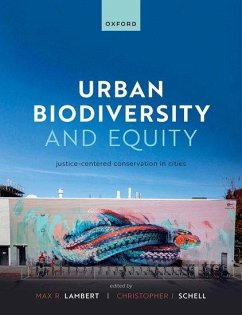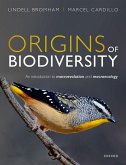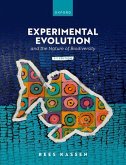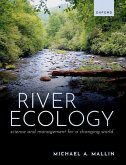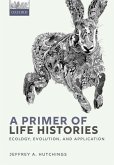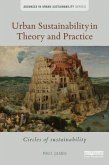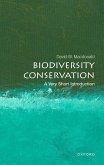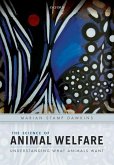Urban Biodiversity and Equity
Justice-Centered Conservation in Cities
Herausgeber: Lambert, Max (Aquatic Research Section Manager; Schell, Christopher (Assistant
Urban Biodiversity and Equity
Justice-Centered Conservation in Cities
Herausgeber: Lambert, Max (Aquatic Research Section Manager; Schell, Christopher (Assistant
- Broschiertes Buch
- Merkliste
- Auf die Merkliste
- Bewerten Bewerten
- Teilen
- Produkt teilen
- Produkterinnerung
- Produkterinnerung
Urban systems have a long history and continued legacy of social inequality that govern how cities are both built and managed. This novel text not only highlights these connections, but also illustrates the interdisciplinary approaches needed for advancing a new, justice-centred approach to nature conservation.
Andere Kunden interessierten sich auch für
![Origins of Biodiversity Origins of Biodiversity]() Lindell Bromham (Professor in Ev Professor in Evolutionary BiologyOrigins of Biodiversity56,99 €
Lindell Bromham (Professor in Ev Professor in Evolutionary BiologyOrigins of Biodiversity56,99 €![Experimental Evolution and the Nature of Biodiversity Experimental Evolution and the Nature of Biodiversity]() Rees Kassen (McGill University, McGill University, Professor of EvoExperimental Evolution and the Nature of Biodiversity58,99 €
Rees Kassen (McGill University, McGill University, Professor of EvoExperimental Evolution and the Nature of Biodiversity58,99 €![River Ecology River Ecology]() Prof Michael A. Mallin (Research Professor, Research Professor, BioRiver Ecology58,99 €
Prof Michael A. Mallin (Research Professor, Research Professor, BioRiver Ecology58,99 €![A Primer of Life Histories A Primer of Life Histories]() Jeffrey A. Hutchings (Professor of Biology, Professor of Biology, DA Primer of Life Histories57,99 €
Jeffrey A. Hutchings (Professor of Biology, Professor of Biology, DA Primer of Life Histories57,99 €![Urban Sustainability in Theory and Practice Urban Sustainability in Theory and Practice]() Paul JamesUrban Sustainability in Theory and Practice42,99 €
Paul JamesUrban Sustainability in Theory and Practice42,99 €![Biodiversity Conservation: A Very Short Introduction Biodiversity Conservation: A Very Short Introduction]() David W. Macdonald (Director of the Wildlife Conservation ResearchBiodiversity Conservation: A Very Short Introduction9,49 €
David W. Macdonald (Director of the Wildlife Conservation ResearchBiodiversity Conservation: A Very Short Introduction9,49 €![The Science of Animal Welfare The Science of Animal Welfare]() Marian Stamp Dawkins (Professor of A Professor of Animal BehaviourThe Science of Animal Welfare49,99 €
Marian Stamp Dawkins (Professor of A Professor of Animal BehaviourThe Science of Animal Welfare49,99 €-
-
-
Urban systems have a long history and continued legacy of social inequality that govern how cities are both built and managed. This novel text not only highlights these connections, but also illustrates the interdisciplinary approaches needed for advancing a new, justice-centred approach to nature conservation.
Hinweis: Dieser Artikel kann nur an eine deutsche Lieferadresse ausgeliefert werden.
Hinweis: Dieser Artikel kann nur an eine deutsche Lieferadresse ausgeliefert werden.
Produktdetails
- Produktdetails
- Verlag: Oxford University Press
- Seitenzahl: 304
- Erscheinungstermin: 26. September 2023
- Englisch
- Abmessung: 243mm x 188mm x 15mm
- Gewicht: 650g
- ISBN-13: 9780198877288
- ISBN-10: 0198877285
- Artikelnr.: 68100735
- Herstellerkennzeichnung
- Libri GmbH
- Europaallee 1
- 36244 Bad Hersfeld
- gpsr@libri.de
- Verlag: Oxford University Press
- Seitenzahl: 304
- Erscheinungstermin: 26. September 2023
- Englisch
- Abmessung: 243mm x 188mm x 15mm
- Gewicht: 650g
- ISBN-13: 9780198877288
- ISBN-10: 0198877285
- Artikelnr.: 68100735
- Herstellerkennzeichnung
- Libri GmbH
- Europaallee 1
- 36244 Bad Hersfeld
- gpsr@libri.de
Max Lambert is the Aquatic Research Section Manager at Washington Department of Fish & Wildlife, Olympia, USA. A conservation biologist who focuses predominantly on amphibians and reptiles, he has over a decade of experience as a research biologist studying how human activities influence wildlife and how animals subsequently evolve to deal with novel environmental conditions, both in natural environments and in our cities and suburbs. A lifetime member of the Society for Conservation Biology, in 2019 he was awarded a David H. Smith Conservation Research Fellowship which seeks to develop future world leaders and entrepreneurs who are successful at linking conservation science and application. He is currently an editor of Ecological Solutions and Evidence, a new journal from the British Ecological Society that publishes studies from academics and practitioners on conservation. Christopher Schell is an Assistant Professor in the Department of Environmental Science, Policy, and Management at the University of California, Berkeley, USA. He is an urban ecologist whose research integrates evolutionary theory with ecological application to disentangle the processes accentuating human-carnivore conflict. He works closely with underrepresented communities, wildlife managers, cultural institutions, and philanthropic organizations to help foster mutually enriching relationships among people and wildlife. He is a board member of the Urban Wildlife Working Group through The Wildlife Society and is also the Diversity Officer for the Animal Behavior Society.
* 1: Max R. Lambert and Christopher J. Schell: The Imperative of Urban Conservation * Section 1: Urban Nature's Social Fabric * 2: Fushcia-Ann Hoover and Rachel Scarlett: Escaping the Practice of Exclusion: Conservation
Greenspace
and Urban Planning in the Age of Environmental Justice * 3: Kelli L. Larson and Jeffrey A. Brown: Human Motivations and Constraints in Urban Conservation * 4: Liba Pejchar and Sarah Reed: Conservation on the Urban Fringe: Sustaining Biodiversity and Advancing Equity in Suburban Ecosystems * 5: Laura Guderyahn and Mary Logalbo: Portland's Conservation Organizations: Acknowledging Racial Inequity and Responding with Community-Informed Solutions * Section 2: Innovative Approaches for Understanding and Prioritizing Equitable Urban Conservation * 6: Dexter Locke
J. Morgan Grove
and Steward T. A. Pickett: The Role of Urban Tree Canopies in Environmental Justice and Conserving Biodiversity * 7: Deja J. Perkins
Lauren M. Nichols
and Robert R. Dunn: Participatory Science for Equitable Urban Biodiversity Research and Practice * 8: Seth Magle
Mason Fidino
Liza Lehrer
Tobin Magle
and Myla Aronson: Conservation Through Multi-City Ecological Networks * 9: Kevin Avilés-Rodriguez
Kimberly Hughes
Jonathan L. Richardson
and Jason Munshi-South: Molecular Methods Through an Urban Social-Ecological Focus * 10: Kaberi Kar Gupta
Madhusudan Khatti
Vidisha Kulkarni
Hari Prakash J. Ramesh
Harshitha C. Kumar
Kesang Bhutia
Soumya Kori
Rajeev Bacchu
and Arun P. Visweswaran: Urban Flagship Umbrella Species and Slender Lorises as an Example for Urban Conservation * 11: (Lauren A. Stanton
Christine Wilkinson
Lisa Angeloni
Sarah Benson-Amram
Christopher J. Schell
and Julie K. Young: Animal Behavior
Cognition
and Human-Wildlife Interactions in Urban Areas * Section 3: Emergent Urban Planning and Management Frameworks for Addressing Societal and Conservation Goals * 12: Kaylee A. Byers
Maureen H. Murray
and Joanne E. Nelson: Urban Places Create Unique Health Spaces for Wildlife
People
and the Environment * 13: Erica Spotswood
Max Lambert
Selena Pang
and Jonathan Young: Developing a Toolbox for Urban Biodiversity Conservation * 14: Bronwen Stanford
Kelly Ikyanan
Robin Grossinger
Erin Beller
Mathew Benjamin
J. Letitia Grenier
Micaela Bazo
Nicole Heller
Myla Aronson
Alexander Felson
Peter Groffman
and Erica Spotswood: Making Nature's City: An Applied Science Framework to Guide Evaluation and Planning for Urban Biodiversity Conservation * Conclusions * 15: Christopher J. Schell
Nyeema C. Harris
Simone Des Roches
Travis Gallo
and Max Lambert: Biodiversity for the People: Future Directions for Urban Biodiversity Conservation
Greenspace
and Urban Planning in the Age of Environmental Justice * 3: Kelli L. Larson and Jeffrey A. Brown: Human Motivations and Constraints in Urban Conservation * 4: Liba Pejchar and Sarah Reed: Conservation on the Urban Fringe: Sustaining Biodiversity and Advancing Equity in Suburban Ecosystems * 5: Laura Guderyahn and Mary Logalbo: Portland's Conservation Organizations: Acknowledging Racial Inequity and Responding with Community-Informed Solutions * Section 2: Innovative Approaches for Understanding and Prioritizing Equitable Urban Conservation * 6: Dexter Locke
J. Morgan Grove
and Steward T. A. Pickett: The Role of Urban Tree Canopies in Environmental Justice and Conserving Biodiversity * 7: Deja J. Perkins
Lauren M. Nichols
and Robert R. Dunn: Participatory Science for Equitable Urban Biodiversity Research and Practice * 8: Seth Magle
Mason Fidino
Liza Lehrer
Tobin Magle
and Myla Aronson: Conservation Through Multi-City Ecological Networks * 9: Kevin Avilés-Rodriguez
Kimberly Hughes
Jonathan L. Richardson
and Jason Munshi-South: Molecular Methods Through an Urban Social-Ecological Focus * 10: Kaberi Kar Gupta
Madhusudan Khatti
Vidisha Kulkarni
Hari Prakash J. Ramesh
Harshitha C. Kumar
Kesang Bhutia
Soumya Kori
Rajeev Bacchu
and Arun P. Visweswaran: Urban Flagship Umbrella Species and Slender Lorises as an Example for Urban Conservation * 11: (Lauren A. Stanton
Christine Wilkinson
Lisa Angeloni
Sarah Benson-Amram
Christopher J. Schell
and Julie K. Young: Animal Behavior
Cognition
and Human-Wildlife Interactions in Urban Areas * Section 3: Emergent Urban Planning and Management Frameworks for Addressing Societal and Conservation Goals * 12: Kaylee A. Byers
Maureen H. Murray
and Joanne E. Nelson: Urban Places Create Unique Health Spaces for Wildlife
People
and the Environment * 13: Erica Spotswood
Max Lambert
Selena Pang
and Jonathan Young: Developing a Toolbox for Urban Biodiversity Conservation * 14: Bronwen Stanford
Kelly Ikyanan
Robin Grossinger
Erin Beller
Mathew Benjamin
J. Letitia Grenier
Micaela Bazo
Nicole Heller
Myla Aronson
Alexander Felson
Peter Groffman
and Erica Spotswood: Making Nature's City: An Applied Science Framework to Guide Evaluation and Planning for Urban Biodiversity Conservation * Conclusions * 15: Christopher J. Schell
Nyeema C. Harris
Simone Des Roches
Travis Gallo
and Max Lambert: Biodiversity for the People: Future Directions for Urban Biodiversity Conservation
* 1: Max R. Lambert and Christopher J. Schell: The Imperative of Urban Conservation * Section 1: Urban Nature's Social Fabric * 2: Fushcia-Ann Hoover and Rachel Scarlett: Escaping the Practice of Exclusion: Conservation
Greenspace
and Urban Planning in the Age of Environmental Justice * 3: Kelli L. Larson and Jeffrey A. Brown: Human Motivations and Constraints in Urban Conservation * 4: Liba Pejchar and Sarah Reed: Conservation on the Urban Fringe: Sustaining Biodiversity and Advancing Equity in Suburban Ecosystems * 5: Laura Guderyahn and Mary Logalbo: Portland's Conservation Organizations: Acknowledging Racial Inequity and Responding with Community-Informed Solutions * Section 2: Innovative Approaches for Understanding and Prioritizing Equitable Urban Conservation * 6: Dexter Locke
J. Morgan Grove
and Steward T. A. Pickett: The Role of Urban Tree Canopies in Environmental Justice and Conserving Biodiversity * 7: Deja J. Perkins
Lauren M. Nichols
and Robert R. Dunn: Participatory Science for Equitable Urban Biodiversity Research and Practice * 8: Seth Magle
Mason Fidino
Liza Lehrer
Tobin Magle
and Myla Aronson: Conservation Through Multi-City Ecological Networks * 9: Kevin Avilés-Rodriguez
Kimberly Hughes
Jonathan L. Richardson
and Jason Munshi-South: Molecular Methods Through an Urban Social-Ecological Focus * 10: Kaberi Kar Gupta
Madhusudan Khatti
Vidisha Kulkarni
Hari Prakash J. Ramesh
Harshitha C. Kumar
Kesang Bhutia
Soumya Kori
Rajeev Bacchu
and Arun P. Visweswaran: Urban Flagship Umbrella Species and Slender Lorises as an Example for Urban Conservation * 11: (Lauren A. Stanton
Christine Wilkinson
Lisa Angeloni
Sarah Benson-Amram
Christopher J. Schell
and Julie K. Young: Animal Behavior
Cognition
and Human-Wildlife Interactions in Urban Areas * Section 3: Emergent Urban Planning and Management Frameworks for Addressing Societal and Conservation Goals * 12: Kaylee A. Byers
Maureen H. Murray
and Joanne E. Nelson: Urban Places Create Unique Health Spaces for Wildlife
People
and the Environment * 13: Erica Spotswood
Max Lambert
Selena Pang
and Jonathan Young: Developing a Toolbox for Urban Biodiversity Conservation * 14: Bronwen Stanford
Kelly Ikyanan
Robin Grossinger
Erin Beller
Mathew Benjamin
J. Letitia Grenier
Micaela Bazo
Nicole Heller
Myla Aronson
Alexander Felson
Peter Groffman
and Erica Spotswood: Making Nature's City: An Applied Science Framework to Guide Evaluation and Planning for Urban Biodiversity Conservation * Conclusions * 15: Christopher J. Schell
Nyeema C. Harris
Simone Des Roches
Travis Gallo
and Max Lambert: Biodiversity for the People: Future Directions for Urban Biodiversity Conservation
Greenspace
and Urban Planning in the Age of Environmental Justice * 3: Kelli L. Larson and Jeffrey A. Brown: Human Motivations and Constraints in Urban Conservation * 4: Liba Pejchar and Sarah Reed: Conservation on the Urban Fringe: Sustaining Biodiversity and Advancing Equity in Suburban Ecosystems * 5: Laura Guderyahn and Mary Logalbo: Portland's Conservation Organizations: Acknowledging Racial Inequity and Responding with Community-Informed Solutions * Section 2: Innovative Approaches for Understanding and Prioritizing Equitable Urban Conservation * 6: Dexter Locke
J. Morgan Grove
and Steward T. A. Pickett: The Role of Urban Tree Canopies in Environmental Justice and Conserving Biodiversity * 7: Deja J. Perkins
Lauren M. Nichols
and Robert R. Dunn: Participatory Science for Equitable Urban Biodiversity Research and Practice * 8: Seth Magle
Mason Fidino
Liza Lehrer
Tobin Magle
and Myla Aronson: Conservation Through Multi-City Ecological Networks * 9: Kevin Avilés-Rodriguez
Kimberly Hughes
Jonathan L. Richardson
and Jason Munshi-South: Molecular Methods Through an Urban Social-Ecological Focus * 10: Kaberi Kar Gupta
Madhusudan Khatti
Vidisha Kulkarni
Hari Prakash J. Ramesh
Harshitha C. Kumar
Kesang Bhutia
Soumya Kori
Rajeev Bacchu
and Arun P. Visweswaran: Urban Flagship Umbrella Species and Slender Lorises as an Example for Urban Conservation * 11: (Lauren A. Stanton
Christine Wilkinson
Lisa Angeloni
Sarah Benson-Amram
Christopher J. Schell
and Julie K. Young: Animal Behavior
Cognition
and Human-Wildlife Interactions in Urban Areas * Section 3: Emergent Urban Planning and Management Frameworks for Addressing Societal and Conservation Goals * 12: Kaylee A. Byers
Maureen H. Murray
and Joanne E. Nelson: Urban Places Create Unique Health Spaces for Wildlife
People
and the Environment * 13: Erica Spotswood
Max Lambert
Selena Pang
and Jonathan Young: Developing a Toolbox for Urban Biodiversity Conservation * 14: Bronwen Stanford
Kelly Ikyanan
Robin Grossinger
Erin Beller
Mathew Benjamin
J. Letitia Grenier
Micaela Bazo
Nicole Heller
Myla Aronson
Alexander Felson
Peter Groffman
and Erica Spotswood: Making Nature's City: An Applied Science Framework to Guide Evaluation and Planning for Urban Biodiversity Conservation * Conclusions * 15: Christopher J. Schell
Nyeema C. Harris
Simone Des Roches
Travis Gallo
and Max Lambert: Biodiversity for the People: Future Directions for Urban Biodiversity Conservation

